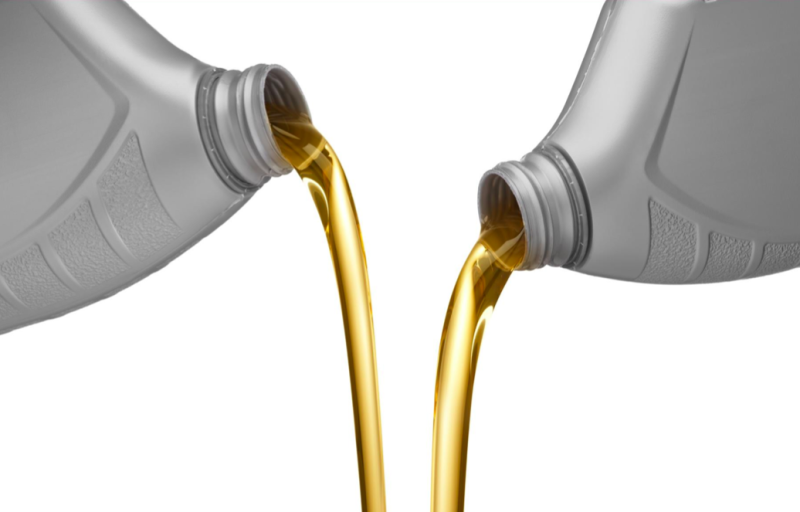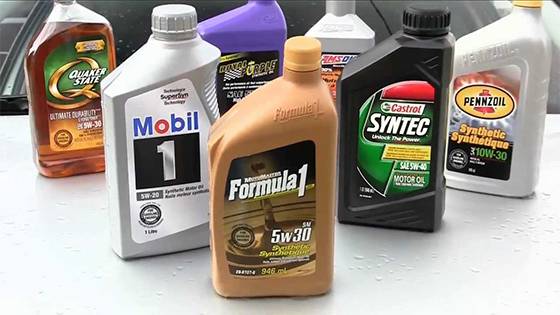Pickup Trucks 101: Synthetic or Conventional Oil?

Changing fluids in a pickup truck has been necessary since the first one rolled off the assembly line more than 100 years ago. Vehicles — and what goes into them — are constantly changing and improving, especially in the last 20 years. With so many types of oil available, we’re focusing this installment of Pickup Trucks 101 on the best motor oil to use for pickup trucks.
Keep in mind that many of the strategies that apply to motor oil carry over for most of the lubricants used in your pickup. The types of available gear oil, transmission oil (for manual transmissions), transmission fluid, transfer case oil and even grease for greaseable joints will have performance advantages similar to the types of motor oil discussed.
The Purpose of Oil

For most vehicles, oils are used for lubricating and dissipating heat; grease in mechanical joints are the main exception to this, as their focus is on lubrication with cooling being an extra property. Having clean lubricants is imperative for a vehicle to function properly.
While there is a variety of differences between oil and grease brands and ratings, there are two main properties to look at: viscosity and base oil.
Oils receive single-grade and multigrade ratings, with multigrade being the more common option today. Multigrade oils contain additives that allow them to have a winter and summer rating. For example, in 10W-30 oil — in which the “W” means “winter” — behaves like an SAE International 10 viscosity rating at low temperatures and an SAE 30 viscosity rating at high temperatures.
Some vehicles today require or recommend the use of synthetic oils, but if a vehicle doesn’t, is it OK to use synthetic oil? What are the fundamental differences between synthetic and conventional oils? Do synthetic and conventional oils have different oil change intervals.
Conventional Oil
Conventional oil has been used for almost as long as internal combustion engines have been around. While conventional oils have improved considerably over time, they still use the same crude oil base as they did 100 years ago. Crude oil has a lot of naturally occurring, unwanted compounds that remain after processing. These impurities can be detrimental to the oil’s function. Additives in new conventional oils override some — but not all — of those impurities and they function much better than the oils of yesteryear.
The main benefit of using conventional oil instead of synthetic is cost. Conventional oil is significantly less expensive than synthetic. If conventional oil is changed on a regular schedule, it will work fine for most vehicles.
The downside is that conventional oil breaks down quicker than synthetic and doesn’t hold up in high-heat applications. And for pickups used in rough terrain, for heavy towing or those that experience long intervals between oil changes, conventional oil will not provide the same level of protection as a synthetic oil.
Synthetic Oil

Synthetic oils have been around since World War II, but they’ve started to boom in the last 10 to 15 years. Synthetic oils are made from more refined raw materials such as mineral oil.
The benefit of synthetic oil is that it is purer and allows for a wider viscosity range. For example: While 0W-40 is readily available in a synthetic, the biggest range commonly found in conventional oil is 5W-30. Synthetic oils also don’t degrade as easily at high temperatures, they flow better at low temperatures, have better shear properties and hold their properties longer than conventional oils. Synthetic oil also reduces friction within the engine, promoting better fuel mileage, and you don’t have to change it as frequently.
Both conventional and synthetic oils have additives to reduce sludge buildup, keep the engine clean and reduce corrosion. Because synthetic oil holds its properties longer, the additives will also last longer. All of this equates to better engine protection and longevity.
The downside is that synthetic oil costs significantly more than conventional oil. If you consider only cost, synthetic oils will be more expensive; however, when you factor in better fuel economy and reduced engine wear, synthetic has the potential of saving you money.
Which Oil Is Best?

There are many opinions about which oil you should use in your pickup. Always use what the grade the owner’s manual recommends or better, and follow the manufacturer’s oil change interval.
So, is it OK to switch between conventional and synthetic oil? Again, if the oil in the engine meets the specs laid out in the owner’s manual, you can use conventional, a synthetic blend or full synthetic oil, and switch between them as desired. The oils can even be mixed, if needed.
When doing an oil change, you should use one type of oil, but if you are a quart low and the gas station doesn’t have your favorite brand of oil, pick one that meets the specs listed in the owner’s manual and you should be fine.
Some consumers have complained that after switching to synthetic oil their vehicle began leaking more oil. While this is possible, it only happens when there is an underlying condition, such as a bad seal that blocked the used conventional oil, but doesn’t block the new synthetic.
AAA found that synthetic oils outperformed conventional oils in eight ASTM International tests by 47 percent. In short, it’s almost always better for the engine, and other components, to use synthetic oils and greases for all the lubrication needs of a pickup. Also, be aware that some oil filters are specific to synthetic or conventional oils.
If you are on a tight budget, then conventional oil may better suit your needs. Not only is the oil less expensive, but the oil filter can be less expensive as well.
Cars.com’s Editorial department is your source for automotive news and reviews. In line with Cars.com’s long-standing ethics policy, editors and reviewers don’t accept gifts or free trips from automakers. The Editorial department is independent of Cars.com’s advertising, sales and sponsored content departments.
Featured stories



